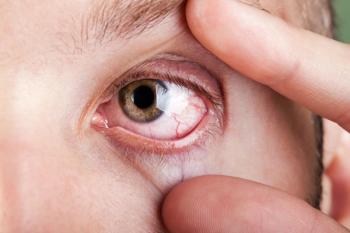
EyeCon 2025: An MD's perspective on managing ocular trauma
Thomas Albini, MD, shares his insights about common cases and the triaging process for patients with ocular trauma.
Thomas Albini, MD, a retina surgeon and uveitis specialist at Bascom Palmer, delivered a detailed presentation on ocular trauma, specifically focusing on posterior segment trauma and surgical repair of open globe injuries. The talk, given alongside Alison Bozung, OD, FAAO, was presented at EyeCon 2025, which ran from September 26-27 in Hollywood, Florida.
The presentation emphasized critical aspects of managing eye injuries and their potential complications and highlighted several key areas of ocular trauma management. First and foremost, Albini stressed the importance of immediate medical intervention. Patients with eye injuries should receive prompt antibiotic treatment and a tetanus shot to prevent potential infections. He particularly emphasized the need for a low threshold when evaluating potential intraocular foreign bodies, noting that some serious injuries can appear deceptively minor. Imaging plays a crucial role in comprehensive trauma assessment. Albini recommended CT scans as an essential diagnostic tool, allowing medical professionals to detect subtle or occult injuries that might not be immediately visible during a standard examination. This approach helps uncover hidden orbital or intraocular injuries that could have significant long-term consequences.
The talk covered a wide range of injury types, including:
- Sports-related injuries (golf balls, baseballs)
- Workplace accidents (nail guns, metal-to-metal impacts)
- Acid and base chemical splashes
- Fall-related injuries, particularly in elderly patients
A critical insight from Albini was the increased risk pattern for patients who have already experienced an eye injury. Individuals with prior eye trauma are more likely to suffer subsequent injuries due to factors like fall risks, occupational hazards, or insufficient eye protection awareness. Bascom Palmer's trauma center is specifically equipped to handle complex ocular trauma cases. Their comprehensive approach involves a detailed triage process that moves from patient history through physical examination to advanced imaging studies. For any trauma showing signs of urgent surgical intervention—such as suspected intraocular foreign bodies, open globe injuries, or chemical burns—their emergency room is prepared to provide immediate, specialized care. The overarching message was clear: prompt, specialized medical attention is crucial in managing ocular trauma, with a focus on prevention, early detection, and comprehensive treatment.
Newsletter
Want more insights like this? Subscribe to Optometry Times and get clinical pearls and practice tips delivered straight to your inbox.













































